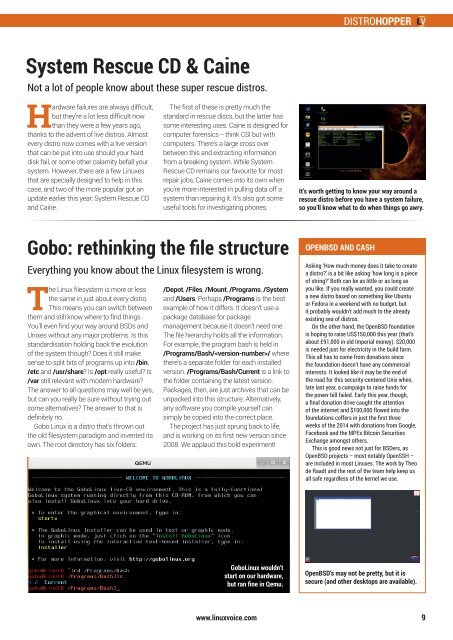Linux-Voice-Issue-001
Linux-Voice-Issue-001
Linux-Voice-Issue-001
Create successful ePaper yourself
Turn your PDF publications into a flip-book with our unique Google optimized e-Paper software.
DISTROHOPPER<br />
System Rescue CD & Caine<br />
Not a lot of people know about these super rescue distros.<br />
Hardware failures are always difficult,<br />
but they’re a lot less difficult now<br />
than they were a few years ago,<br />
thanks to the advent of live distros. Almost<br />
every distro now comes with a live version<br />
that can be put into use should your hard<br />
disk fail, or some other calamity befall your<br />
system. However, there are a few <strong>Linux</strong>es<br />
that are specially designed to help in this<br />
case, and two of the more popular got an<br />
update earlier this year: System Rescue CD<br />
and Caine.<br />
The first of these is pretty much the<br />
standard in rescue discs, but the latter has<br />
some interesting uses. Caine is designed for<br />
computer forensics -- think CSI but with<br />
computers. There’s a large cross over<br />
between this and extracting information<br />
from a breaking system. While System<br />
Rescue CD remains our favourite for most<br />
repair jobs, Caine comes into its own when<br />
you’re more interested in pulling data off a<br />
system than repairing it. It’s also got some<br />
useful tools for investigating phones.<br />
It’s worth getting to know your way around a<br />
rescue distro before you have a system failure,<br />
so you’ll know what to do when things go awry.<br />
Gobo: rethinking the file structure<br />
Everything you know about the <strong>Linux</strong> filesystem is wrong.<br />
The <strong>Linux</strong> filesystem is more or less<br />
the same in just about every distro.<br />
This means you can switch between<br />
them and still know where to find things.<br />
You’ll even find your way around BSDs and<br />
Unixes without any major problems. Is this<br />
standardisation holding back the evolution<br />
of the system though? Does it still make<br />
sense to split bits of programs up into /bin,<br />
/etc and /usr/share? Is /opt really useful? Is<br />
/var still relevant with modern hardware?<br />
The answer to all questions may well be yes,<br />
but can you really be sure without trying out<br />
some alternatives? The answer to that is<br />
definitely no.<br />
Gobo <strong>Linux</strong> is a distro that’s thrown out<br />
the old filesystem paradigm and invented its<br />
own. The root directory has six folders:<br />
/Depot, /Files, /Mount, /Programs, /System<br />
and /Users. Perhaps /Programs is the best<br />
example of how it differs. It doesn’t use a<br />
package database for package<br />
management because it doesn’t need one.<br />
The file hierarchy holds all the information.<br />
For example, the program bash is held in<br />
/Programs/Bash// where<br />
there’s a separate folder for each installed<br />
version. /Programs/Bash/Current is a link to<br />
the folder containing the latest version.<br />
Packages, then, are just archives that can be<br />
unpacked into this structure. Alternatively,<br />
any software you compile yourself can<br />
simply be copied into the correct place.<br />
The project has just sprung back to life,<br />
and is working on its first new version since<br />
2008. We applaud this bold experiment!<br />
OPENBSD AND CASH<br />
Asking ‘How much money does it take to create<br />
a distro?’ is a bit like asking ‘how long is a piece<br />
of string?’ Both can be as little or as long as<br />
you like. If you really wanted, you could create<br />
a new distro based on something like Ubuntu<br />
or Fedora in a weekend with no budget, but<br />
it probably wouldn’t add much to the already<br />
existing sea of distros.<br />
On the other hand, the OpenBSD foundation<br />
is hoping to raise US$150,000 this year (that’s<br />
about £91,000 in old Imperial money). $20,000<br />
is needed just for electricity in the build farm.<br />
This all has to come from donations since<br />
the foundation doesn’t have any commercial<br />
interests. It looked like it may be the end of<br />
the road for this security-centered Unix when,<br />
late last year, a campaign to raise funds for<br />
the power bill failed. Early this year, though,<br />
a final donation drive caught the attention<br />
of the internet and $100,000 flowed into the<br />
foundations coffers in just the first three<br />
weeks of the 2014 with donations from Google,<br />
Facebook and the MPEx Bitcoin Securities<br />
Exchange amongst others.<br />
This is good news not just for BSDers, as<br />
OpenBSD projects – most notably OpenSSH –<br />
are included in most <strong>Linux</strong>es. The work by Theo<br />
de Raadt and the rest of the team help keep us<br />
all safe regardless of the kernel we use.<br />
Gobo<strong>Linux</strong> wouldn’t<br />
start on our hardware,<br />
but ran fine in Qemu.<br />
OpenBSD’s may not be pretty, but it is<br />
secure (and other desktops are available).<br />
www.linuxvoice.com 9


